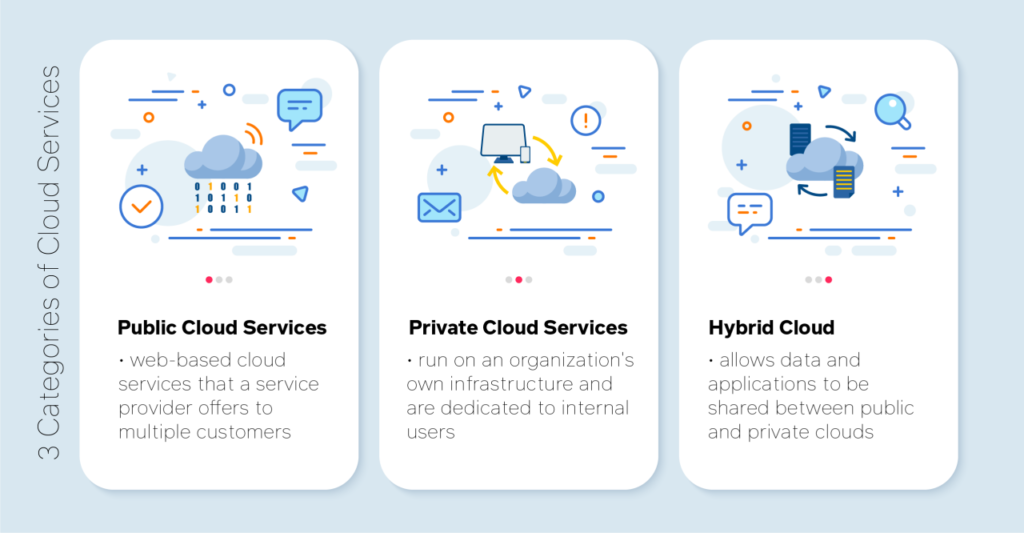Even before the pandemic, organizations were using cloud services to create new opportunities in digital business. Learn which industries are benefiting from cloud!
With the majority of workers across the world still logging into the office from home, it is clear that now more than ever, companies need reliable infrastructure. Yet, the cloud’s functions are not limited to merely supporting infrastructure and operations. According to a recent report from Gartner, through the cloud, organizations are creating a foundation for new opportunities in digital business, including next-generation IT solutions. In fact, Gartner predicts that by 2024, more than 45% of IT spending on system infrastructure, infrastructure software, application software and business process outsourcing will shift from traditional solutions to cloud.
But it’s not just IT. Plenty of industries are embracing cloud to reap a variety of benefits. From manufacturing to retail, cloud environments offer everything from data center consolidation to cloud back up services to hosting mobile apps.
How has cloud helped us cope with COVID-19? Our insights can be found here!
Types of Cloud Services
When it comes to cloud-based services, no matter their industry, companies first are choosing the type of service that fits their needs best. According to TechTarget, the most common cloud offerings include the following three:
1. Software as a service (SaaS)
This software distribution model hosts applications created by a vendor or service provider and makes them available to customers over a network like the internet. Some examples include G Suite — formerly Google Apps — Microsoft Office 365, Salesforce, and Workday.
2. Platform as a service (PaaS)
With PaaS, operating systems and associated services are delivered over the internet without installation or downloads. As a result, customers are able to create and deploy applications on this cloud platform without needing to invest in the underlying infrastructure. Commonly-used examples include Amazon Web Services’ Elastic Beanstalk, Microsoft Azure, and Salesforce’s App Cloud.
3. Infrastructure as a service (IaaS)
Through IaaS, the equipment used to support operations, including storage, hardware and software, servers and networking components, are outsourced and made accessible over a network. Some examples include Amazon Web Services, IBM Bluemix, and Microsoft Azure.
Cloud services typically come in three categories:

Public Cloud Services
Web-based cloud services that a service provider offers to multiple customers are referred to as public cloud services. The SaaS, PaaS and IaaS providers noted above may all be said to be providing public cloud-based services.
Private Cloud Services
Private cloud services, in contrast, are not made generally available to individual or corporate users or subscribers. Private cloud-based services use technologies and approaches associated with public clouds, such as virtualization and self-service. But private cloud services run on an organization’s own infrastructure and are dedicated to internal users, rather than multiple, external customers.
Hybrid Cloud
This service combines public clouds and private clouds by allowing data and applications to be shared between them.
How has COVID-19 accelerated the cloud journey? Get insights from our free eBook!
Cloud Computing Services By Industry

When people use the term ‘cloud’, they typically are thinking in at least three different dimensions or directions, which include replacing on-premises applications with SaaS models or single host applications, cloud middleware, and cloud infrastructure, in which compute and cloud storage resources are accessed by a cloud provider.
According to ZDNet, since public cloud options are not a one-size-fits-all solution for every industry, vertical-specific cloud solutions are emerging. Also known as ‘industry clouds,’ these vertical cloud solutions are growing rapidly due to the fact that many legacy vendors are pushing organizations to move away from old systems and keep up with the changing business tech environment by becoming more cloud-like.
Though many industries are embracing the cloud, the following five industries are seeing the largest investments in industry cloud solutions:
1. Manufacturing – In 2019, Forrester Research predicted that by 2020, the majority (84 percent) of global purchase influencers in North American manufacturing firms would increase their use of cloud. Thanks to the rise of industry cloud, core transactions – including the systems that are used to run the factory lines to handle the inflow of parts and materials that are going into production, as well as the feeding of the end product that goes into systems for delivery or for sales to customers in manufacturing – are moving to the cloud. Further, since automation and machine learning are predicted to take over the manufacturing industry by 2024, this field is prepped and ready for digital transformation.
2. Retail – Due to the massive amounts of data that the retail industry generates, the sector is primed to move to the cloud. Forrester Research determined that roughly 77% of global purchase influencers in North American retail organizations cited the increasing use of cloud as moderate, high, or critical priority in 2020. To maintain such a large volume of data, retailers must scale up on data storage, collection, and organization practices. And when it comes to the cycling of goods and inventory, this industry cloud makes a huge impact on core retail management systems.
By helping manage the inflow and outflow of retailers’ goods, and how that flows through their own distribution system of stock that’s in warehouses, versus stock that’s on trucks, in stores, or has just been sold, these systems keep track of those stock levels, and make sure that there is a flow of goods in to replace what’s going out to the customer. Further, cloud technology also helps track business performance of various retail stores and outlets, based on whatever factors the companies want, improving efficiency, sales, and customer satisfaction in the process.
3. Government – Mainly focused in North America, hyper-scale providers are supplying either a specific government version of the cloud or some form of a focused government or country-specific cloud. These clouds help alleviate workload isolation, working as a closed community, which guarantees no classified data will leave the country. When it comes to security concerns, users need to receive specific permission from the government to host workloads on a government cloud.
4. Healthcare – This industry has a dire need for both data management and storage. Forrester Research found that in 2020, 74 percent of healthcare global purchase influencers in North America identified that the demand for cloud use is a moderate, high, or critical priority. Since the industry stores so many personal records, healthcare industry clouds allow for a central, secure place to store information. Further, cloud computing can also help healthcare professionals track and keep data about patients’ care, behavior, and health progression. Armed with this information, health professionals can look at success rates and correlating scenarios, certain drug reactions, and other insights.
5. Agriculture – The agriculture sector has been helping farmers learn more about their environment and crop production, allowing for innovation thanks to the internet of things (IoT) and big data. Paired with an industry cloud, these technologies can lead to enormously potent insights for farms and agriculture leaders. For instance, the IoT plus cloud enabled agricultural manufacturing to really take advantage of cloud capabilities. Through the use of sensors, the cloud can help the agriculture industry capture information about its environment, including soil sensors, machine sensors, seed or grain sensors, and sensors around animals.
Looking for customized cloud solutions? Look no further – Stefanini has you covered.
Take Advantage of the Cloud with Stefanini
Across IaaS, PaaS, and SaaS, we will work with your unique business needs to balance data accessibility with security concerns and address the growing need for agility to adapt to a connected world. With our decades of technological experience and unique position as a Microsoft Gold Partner in Cloud Productivity, we can create customized cloud solutions for your business.
Ready to get started? Connect with a Stefanini expert today!



















